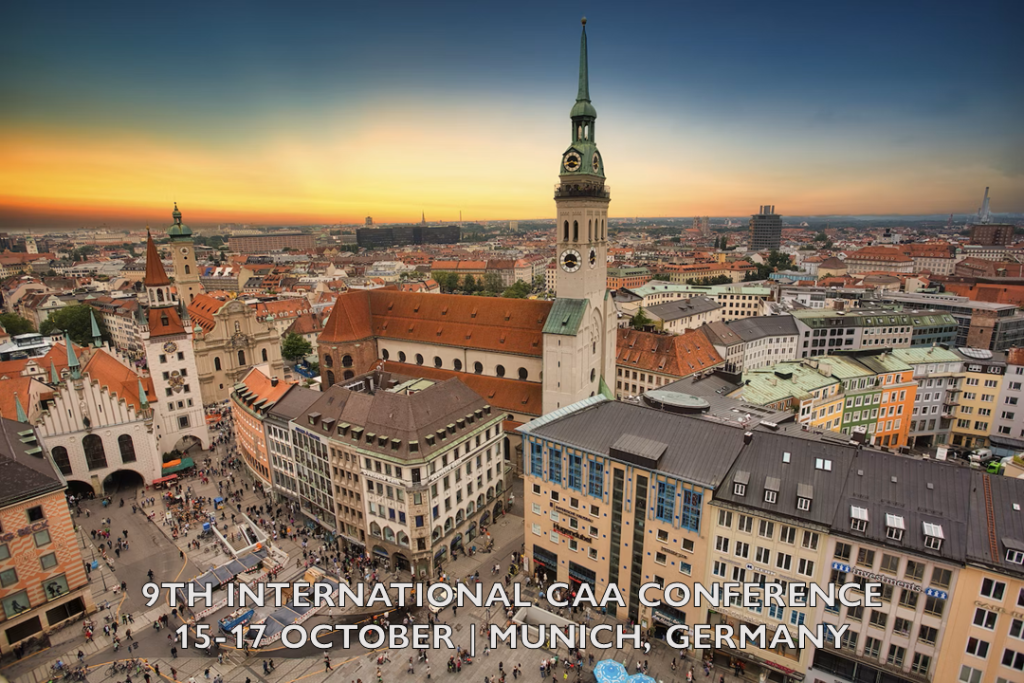News & Events
First call for abstracts - iCAA conference
Abstracts are now being accepted for the 9th International Cerebral Amyloid Angiopathy Conference Munich! Both preclinical and clinical researchers are encouraged to submit their abstract for oral or poster presentations. The deadline for abstract submission is May 31, 2024.
Abstracts should include a Title (no more than 100 characters with spaces), Presenting Author (underlined) and co-authors, and their affiliations. Abstracts (no more than 400 words) should include Background, Method, Results, and Discussion. All abstracts will be scored by at least three Reviewers. Based on the Reviewers’ scores, the 9th ICAA-Conference Scientific Advisory Committee will decide on whether a submitted abstract should be considered for oral or poster presentation.
Visit the iCAA conference website for more information on abstract requirements and how to submit.
Last Call for iCAA conference symposium!
The 9th International CAA Conference will be held in Munich, Germany, October 15-17, 2024. This meeting, which will be held as an on site (in person) format only, comes at a time of great progress towards improved diagnosis and potential disease-modifying treatment of CAA. We are inviting all CAA researchers to to suggest symposium ideas for the Munich ICAA conference. Please contemplate which areas related to the science or clinical manifestations of cerebrovascular amyloid would be of particular interest for you and colleagues from different fields of CAA research. Each symposium should have between 2-4 speakers. You don’t need to contact potential speakers (although you are welcome to do so). The ICAA Conference scientific organizing committee consisting of Charlotte Cordonnier, Steven Greenberg, Julie Schneider, Eric Smith, Mark van Buchem, Susanne van Veluw, and Marcel Verbeek will review all submissions.
Please note that the organizing committee may make changes to the proposed symposia or combine parts of various proposals into a single symposium. The deadline for submissions is March 1, 2024. We look forward to seeing you in Munich!
Please suggest your symposium at : office@icaaconference.org
You will be asked for a session title, brief introduction (<100 words), titles for up to 4 talks, and primary and alternate speakers for each talk. We encourage proposals related to the full range of topics in the cerebral amyloid angiopathy and small vessel brain disease fields, including diagnosis, neuroimaging, clinical features, candidate treatments, neuropathology, genetics, animal models, vascular biology, molecular mechanisms, amyloid biology, and vascular physiology.
The International Registry for Iatrogenic Cerebral Amyloid Angiopathy is now LIVE!
We are thrilled to announce the launch of the International Registry for Iatrogenic Cerebral Amyloid Angiopathy (iCAA), an initiative aimed at gathering data on cases with iCAA around the globe.
iCAA occurs following medical procedures as a consequence of transmission of the amyloid-β protein. The causative procedures to date have mostly used cadaveric human material; this includes cadaveric dura mater (including “Lyodura”) for dural patches and for embolization, and treatment with cadaveric human growth hormone. The full range of causative procedures are not known; others, such as neurosurgery without cadaveric material and blood transfusion have also been implicated.
The registry will gather essential data on the incidence, clinical presentation, natural progression, and potential causative factors associated with iCAA. It will provide regular (annual or biennial) reports on the number of cases identified worldwide, and a rolling report on clinical follow-up events. The Registry will also act as a platform to facilitate future sub-studies, for example those relating to fluid-based or neuroimaging biomarkers.
The registry has received full ethical approval. It asks for completely anonymized data, which can be entered via a secure online portal. Follow-up data will be requested annually.
If you have clinical experience working with iCAA patients, please participate! This collaboration will significantly contribute to advancing knowledge and promoting effective strategies for managing and preventing iCAA.
For more information, please get in touch with g.banerjee@ucl.ac.uk or k.kaushik@lumc.nl
The Leducq Foundation Awarded an $8 Million Grant to Understand the Role of Brain Clearance in Cerebral Amyloid Angiopathy
The Leducq Foundation has awarded a five-year $8 million grant to fund a new transatlantic network of excellence to study the role of brain clearance in cerebral amyloid angiopathy (CAA). CAA is the main cause of hemorrhagic stroke, an important contributor to cognitive decline in older individuals, and the most common vascular comorbidity in Alzheimer’s disease. With the rising aging population, CAA is increasing, and effective disease-modifying interventions are nonexistent. Accumulating evidence is suggesting that defective perivascular brain clearance of waste products (including Amyloid) plays an important role in the pathophysiology of CAA. However, there are many fundamental unknowns regarding how the brain clears waste. Unraveling the mechanisms of brain clearance will have major implications for understanding CAA as well as other common dementia disorders.
The consortium is expected to officially start January 1st 2024, and includes investigators from research sites across the US and Europe: Dr. Benveniste (Yale University, CT), Drs. Iliff & Shih (University of Washington, WA), Dr. Van Nostrand (University of Rhode Island, RI), Drs. Van Veluw & Greenberg (Massachusetts General Hospital, MA), Dr. Bakker (Amsterdam University Medical Center, the Netherlands), Dr. Carare (University of Southampton, UK), Dr. Lorthois (Institut de Mécanique des Fluides de Toulouse, France), Dr. Petzold (German Center for Neurodegenerative Disease in Bonn, Germany), and Dr. Van Osch (Leiden University Medical Center, the Netherlands). The network will be led by North American coordinator Dr. Susanne van Veluw and European coordinator Dr. Matthias van Osch.
The goal of the network is to use a translational approach to study brain waste clearance in CAA. The overarching consortium aims are to 1) establish a data-driven, integrated multi-scale understanding of perivascular brain clearance in health and CAA, 2) translate experimental findings from rodent models to the human brain, and 3) identify relevant driving forces to be tested in future clinical trials to enhance brain clearance.
The Leducq Foundation is an international grant-making organization with a mission to improve human health through international efforts to combat cardiovascular disease and stroke. By forging scientific alliances that transcend national borders and educating young researchers who thrive in an international context, they hope to promote long-term collaborative relationships and to foster innovations in cardiovascular and stroke research, to change the way that patients with cardiovascular and neurovascular disease are diagnosed and treated. For more information, please visit https://www.fondationleducq.org/
“Interested in joining the network? See here for job opportunities.”
New landmark paper on the disease progression of CAA: a pathophysiological framework
This new review paper provides a comprehensive framework and timeline for the disease progression of CAA. The paper summarizes emerging evidence from studies in individuals with Dutch-type CAA, sporadic CAA, and iatrogenic forms of CAA as well findings from experimental studies in mouse models. Key stages that appear to evolve sequentially over two to three decades are initial vascular amyloid-β deposition (stage 1), altered vascular function (stage 2), non-hemorrhagic tissue injury (stage 3), and finally appearance of hemorrhagic brain lesions (stage 4). This timeline of stages and the biology that link them have substantial implications for identifying novel interventions for CAA. This work was the result of a strong collaborative effort across multiple international CAA research sites. Download the paper here.
9th International CAA Conference
We are pleased to announce that the 9th International CAA Conference will take place in Munich, Germany from October 15th to 17th, 2024. Additional information regarding the conference will be made available soon here. We encourage you to mark your calendars and plan to join us for this exciting gathering of researchers, physicians, and others interested in CAA. We look forward to seeing you there!
Recap of the 8th International CAA Conference
The 8th International CAA Conference took place on November 3-5 in Perth, Western Australia. It was a unique meeting in several regards. This was the first time that an International CAA Conference was held outside of Europe or North America, and our first in-person meeting after the Covid-19 pandemic. A broad range of topics was discussed, including novel insights related to iatrogenic CAA, Dutch-type CAA, perivascular amyloid clearance, biomarker research, and Amyloid-Related Imaging Abnormalities (just to name a few). Another ‘first’ was an up-date on the development of the International CAA Association clinical guidelines. The goal of these guidelines will be to provide clinicians worldwide with evidence-based recommendations for the diagnosis and management of CAA. They will be posted on the website as soon as they are finalized. The conference was concluded by a public forum, a first of a kind meeting where researchers and patient advocates from three continents came together in one room to talk about CAA, including Dutch-type CAA. Overall, the 8th International CAA Conference in Perth was a huge success. A big thank you to the local organizers: Drs. Hamid Sohrabi, Ralph Martins, Kevin Taddei, and Samantha Gardener.
The new Boston Criteria (version 2.0) for the diagnosis of CAA were just released
A definite diagnosis of CAA can only be made after death, by examining the brain tissue under the microscope. A breakthrough in the field was the introduction of the Boston criteria in the 1990s, which allowed for the first time to make a diagnosis of possible or probable CAA during life. These criteria are based on the presence of characteristic neuroimaging markers, such as microbleeds in the outer regions of the brain. In 2010, the criteria were updated (modified Boston criteria or version 1.5) as knowledge evolved and imaging techniques improved. And now here we are: twelve years of experience and observations later, with the Boston criteria version 2.0. In this updated version, new imaging markers are included to further help doctors in diagnosing CAA. See for more information here.




